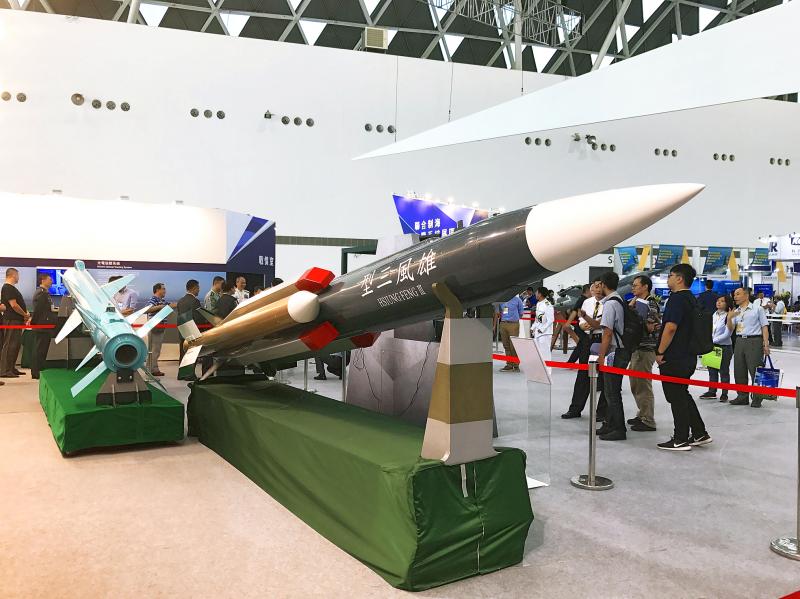The Executive Yuan on Friday revealed the schedule for Taiwan’s indigenous missile and warship production.
The schedule is part of a draft bill on the nation’s sea and air combat power enhancement program that the Cabinet submitted to the legislature.
The NT$240 billion (US$8.65 billion) program, to be implemented from next year to 2026, would also include the acquisition of long-range cruise missiles, upgraded air defense systems and modern warships.

Photo: Hung Chen-hung, Taipei Times
The indigenous Wan Chien air-launched cruise missile with a claimed range of 200km would be produced from next year to 2024, while the Hsiung Sheng cruise missile would be produced from next year to 2025, the bill said.
The Chien Hsiang loitering munition, which has entered mass production, would be produced under the program from next year to 2025, it said.
A long-range variant of the Hsiung Feng III supersonic anti-ship and land-attack missile, which has a claimed effective range of 400km, would be produced from 2023 to 2026, it said.
The Hsiung Feng I and Hsiung Feng II missiles’ coastal defense variants and their dedicated road-based mobile launch vehicles would be produced from next year to 2026, the bill said.
The Hsiung Feng III missile would be produced from 2023 to 2026, it said.
As for naval equipment, two phases of production of Tuo Jiang-class corvettes are planned, it said.
Phase 1 would start next year and phase 2 would start in 2023, while both phases would conclude in 2026, it said.
The Coast Guard Administration’s Anping-class patrol vessels would be retrofitted with missiles, and command and control facilities between 2023 and 2026, it said.
Procurements of the surface-to-air variant of the Tien Chien II missile and the Tien Kung III missile defense system would be integrated in the program, with production from next year to 2026. it said.
The state-owned Chungshan Institute of Science and Technology, which designed most of the program’s equipment and oversees the nation’s missile production, said in a report that it expects revenue to increase 50 percent to an unprecedented NT$95.39 billion next year.

The Ministry of Education (MOE) is to launch a new program to encourage international students to stay in Taiwan and explore job opportunities here after graduation, Deputy Minister of Education Yeh Ping-cheng (葉丙成) said on Friday. The government would provide full scholarships for international students to further their studies for two years in Taiwan, so those who want to pursue a master’s degree can consider applying for the program, he said. The fields included are science, technology, engineering, mathematics, semiconductors and finance, Yeh added. The program, called “Intense 2+2,” would also assist international students who completed the two years of further studies in

Former president Tsai Ing-wen (蔡英文) departed for Europe on Friday night, with planned stops in Lithuania and Denmark. Tsai arrived at Taiwan Taoyuan International Airport on Friday night, but did not speak to reporters before departing. Tsai wrote on social media later that the purpose of the trip was to reaffirm the commitment of Taiwanese to working with democratic allies to promote regional security and stability, upholding freedom and democracy, and defending their homeland. She also expressed hope that through joint efforts, Taiwan and Europe would continue to be partners building up economic resilience on the global stage. The former president was to first

Former president Tsai Ing-wen (蔡英文) on Monday called for greater cooperation between Taiwan, Lithuania and the EU to counter threats to information security, including attacks on undersea cables and other critical infrastructure. In a speech at Vilnius University in the Lithuanian capital, Tsai highlighted recent incidents in which vital undersea cables — essential for cross-border data transmission — were severed in the Taiwan Strait and the Baltic Sea over the past year. Taiwanese authorities suspect Chinese sabotage in the incidents near Taiwan’s waters, while EU leaders have said Russia is the likely culprit behind similar breaches in the Baltic. “Taiwan and our European

The Taipei District Court sentenced babysitters Liu Tsai-hsuan (劉彩萱) and Liu Jou-lin (劉若琳) to life and 18 years in prison respectively today for causing the death of a one-year-old boy in December 2023. The Taipei District Prosecutors’ Office said that Liu Tsai-hsuan was entrusted with the care of a one-year-old boy, nicknamed Kai Kai (剴剴), in August 2023 by the Child Welfare League Foundation. From Sept. 1 to Dec. 23 that year, she and her sister Liu Jou-lin allegedly committed acts of abuse against the boy, who was rushed to the hospital with severe injuries on Dec. 24, 2023, but did not